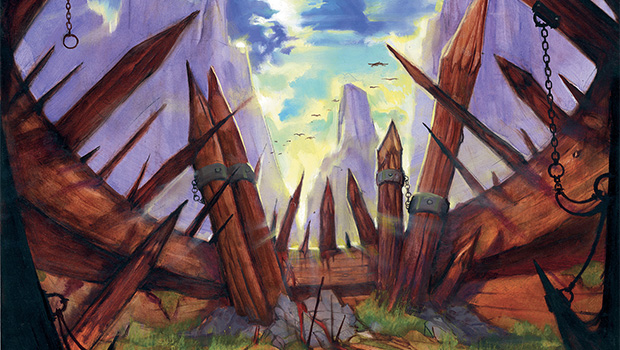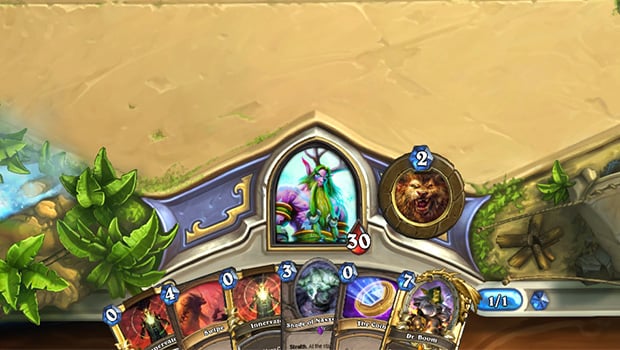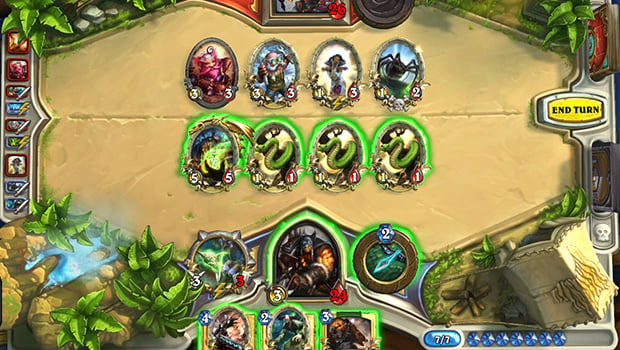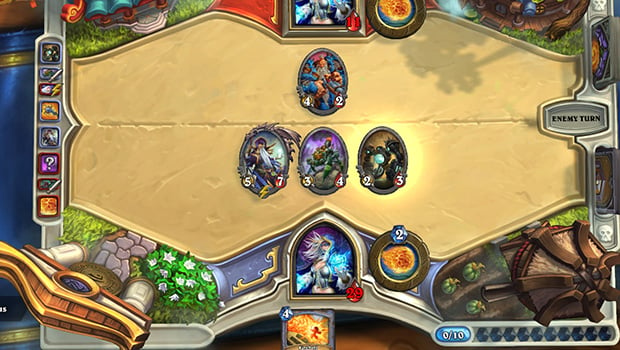The Hearthstone tournament experience

It’s been a while since I participated in any tournaments. I loved the tournament environment. I played Counterstrike when CAL was at its heyday — and I warmed that bench hard at CAL-Premier. I tried my hand at a few League of Legends tournaments but quickly discovered I didn’t have the reflexes or thinking necessary to compete. When I was younger, I played in local Magic: the Gathering events (Alara and Zendikar block). The GeForce NVidia Hearthstone tournament kicked off a few weeks ago which I ended up enrolling for, and it has both a professional and an amateur division. The pros consist of high profile players directly invited into the professional division. So how do you prepare for a tournament?
Preparation
Tournament preparation starts with mentality and attitude. Anyone that wants to find success in competition needs to read this article on Hearthstone Players about scrub mentality. You can’t look down on other players for using a no-skill deck. You can’t refuse to use certain cards or decks because “it’s cheap.” You can’t refuse to use proven strategies because “you don’t want to.” You’re building artificial restrictions. If you want to succeed, you have to set aside that prejudice and stop thinking that certain deck types are beneath you because you’re just going to handicap yourself. Your opponents won’t be doing the same. In Magic, there was a deck type called Jund that I hated so much, I ended up putting together a more expensive deck called Bant (and yes, I was that guy who played Sovereigns of Alara and Eldrazi Conscription combos that incited rage).
Speaking of attitude, let’s discuss pay to win. If you believe that paying for decks nets an unfair advantage, then you should probably stop reading here — don’t bother to compete. You can try to look around for events that restrict Legendary cards, but let’s face it, you’re either going to be paying in money or time to grind out the necessary pieces to field together a competitive deck. While it’s difficult to win games, it’s not impossible either. Set realistic expectations for the capabilities of your decks.
Tournament types
There are several different tournament formats.
- Swiss: My preferred format as it’s used to accommodate a large number of players.
- Single elimination: You get seeded in bracket style play but the moment you lose, you’re out.
- Double elimination: You get seeded in bracket style play but the moment you lose, you drop down to the
loserlower bracket and have to play for your tournament life. - Group play: You square off against everyone else in your group and if you belong to the top half, you advance to the elimination rounds.
I recommend Swiss largely because it’s the best bang for your buck. You’re guaranteed a high number of matches and you play against other players with similar records. Any players who are 2-0 after round two will play against each other and likewise with players possessing a 1-1 record. Some events can take a whole day, you’ll need the stamina to withstand that grind. Others, such as the Geforce event, span multiple weeks.
There are also numerous free events you can join to get your feet wet. For those that want a bigger challenge with a bigger payoff, consider paid tournaments.
- ESL’s Hearthstone Cup
- Hearthstone Southeast Asia Cup
- Innkeeper’s Conquest League (Paid)
- Zotac Hearthstone Cup
Game day
Want to progress and improve? Having different friends willing to spend money or gold with the ability to put together decks is a blessing. Instead of grinding the ladder for practice, you can ask your contacts to play specific decks. Want to practice your Midrange hunter deck against Mech Mage? No problem, your partner can assemble it quickly. I don’t have anyone I can reliably depend on for practice, so I resort to watching videos or queuing into the ladder.
Before the match starts, you select the classes you want to bring. Solid players have an innate knowledge of what classes do well against other classes and they try to bring well-rounded decks that tend to perform well against the most number of classes. If you know your opponent’s class tendencies, you can bring decks tailored to work against them. At this level though, if you keep trying to outsmart your opponent, you’re going to drive yourself silly. I recommend bringing the three classes that you’re strongest and most familiar with.
Once finalized, coordinate the schedule with your opponent to find a time that works well. On match day, you’re all checked in, and now you hope for the best and pray that luck falls your way.
Be a good sport — wish them luck at the start and don’t skip the good game at the end of the match. Screenshot your victory and loss screens at the end of each game. Go a step further and record video of your matchups in the event of any disputes (if allowed). Not only do you have proof of the results, but you can review game footage and find out where you messed up. I’m a big fan of using video for improvement. On the other hand, you can always mess with your opponent and get inside their head. For example, during Magic tournaments, there was a player who always used foil decks. In Hearthstone, that’s the equivalent of players with all gold cards. I felt intimidated when I played against players that had foil decks, it’s one way you can get inside an opponent’s head. Just don’t spam emotes as that might actually represent a rules violation.
When I face my opponents, my nerves start getting frayed. Every turn is played in my head a hundred times over trying to decide the best move that will help secure a game in the win column. Don’t play to not lose. Play to win. Think several turns in advance and what the opponent’s likely response will be in their hand. Use a notepad to write down different spells and minions that the opponent has used throughout each match. If I win and they need to use the same deck again, I can start planning my turns around the cards that I know are in their deck.
Aftermath
Final step is reporting match results and I often get mixed responses at the end of games. During week 1, my opponent failed to check in but we played out our match anyway. I still have the screenshots of the results but unless both players check in on the system, it won’t accept match results. Communications to my opponent did not yield a response so I have to submit a ticket for help to get that fixed. It’s been a week now and I haven’t heard back anything from tournament officials. I suspect the event’s being staffed by volunteers but I recognize that many of the admins handles are prefixed with CEVO, a prominent league known to pay-to-play with Counterstrike. All I can do is sit and wait until my concerns are addressed. My week 2 match was perfect and went the way all matches should go: Timely reporting, courteous opponent, and accurate information.
After the adrenaline finishes it’s circuit around my body, the reflection and self-analysis begins. In other words, the mental berating of “Moron!” or “What were you thinking?” begins. There’s a big reason why I stopped playing League of Legends or Counterstrike because I get so upset with myself. Those are team games and the pressure amplifies because you want to play as close to perfect for your team. When I misplayed, there’s no amount of crap my team can lay on me for missing skill shots or missing assignments because I tend to feel the worst about it. Even my Warcraft raiding guild knows better to give me crap about a mistake because I can do that better than anyone else. I never needed anyone harping on me for those errors because I beat myself up the most about it. But the upside to that? When you colossally screw up, you tend not to do it again.
Sometimes you win. Other times, you learn.
The worst part about losses is the tsunami of emotions that wash over you. You’re angry at yourself because you made a stupid mistake. You’re frustrated that you didn’t take into account a particular play from your opponent. You’re in tears because of that one crucial misstep, your tournament life is now over. The analysis comes later once you’ve cooled down but during the heat of the moment, you’re biggest opponent isn’t the guy who destroyed you.
It’s the person looking back at you in the mirror.
If the time spent and money invested culminated into a loss, it would be demoralizing. That inner voice that berates you is both your biggest strength and weakness. It’s hard to shut that inner voice up because you know that they’re right. You screwed up, you misplayed something, or you got outplayed and you have the face the worst consequence of it all: Being yelled at by yourself. That anguish never really goes away. I’m still haunted by misplays and errors I’ve made when I was younger.
After week 3, I’m currently 4-0 in my matches (that’s 3-0, 3-1, 3-0, and 3-2 respectively). Even winning results in my hands shaking. Can’t handle pressure well at all.
When you’re tired of ranked play, look for a tournament to join and try it out!
Please consider supporting our Patreon!
Join the Discussion
Blizzard Watch is a safe space for all readers. By leaving comments on this site you agree to follow our commenting and community guidelines.
 @Matticus
@Matticus







